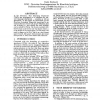Free Online Productivity Tools
i2Speak
i2Symbol
i2OCR
iTex2Img
iWeb2Print
iWeb2Shot
i2Type
iPdf2Split
iPdf2Merge
i2Bopomofo
i2Arabic
i2Style
i2Image
i2PDF
iLatex2Rtf
Sci2ools
102
click to vote
ACL
1990
1990
An Efficient Parsing Algorithm for Tree Adjoining Grammars
In the literature, Tree Adjoining Grammars (TAGs) are propagated to be adequate for natural language description -- analysis as well as generation. In this paper we concentrate on the direction of analysis. Especially important for an implementation of that task is how efficiently this can be done, i.e., how readily the word problem can be solved for TAGs. Up to now, a parser with O(n 6) steps in the worst case was known where n is the length of the input string. In this paper, the result is improved to O(n 4 log n) as a new lowest upper bound. The paper demonstrates how local interpretion of TAG trees allows this reduction.
Related Content
| Added | 07 Nov 2010 |
| Updated | 07 Nov 2010 |
| Type | Conference |
| Year | 1990 |
| Where | ACL |
| Authors | Karin Harbusch |
Comments (0)

